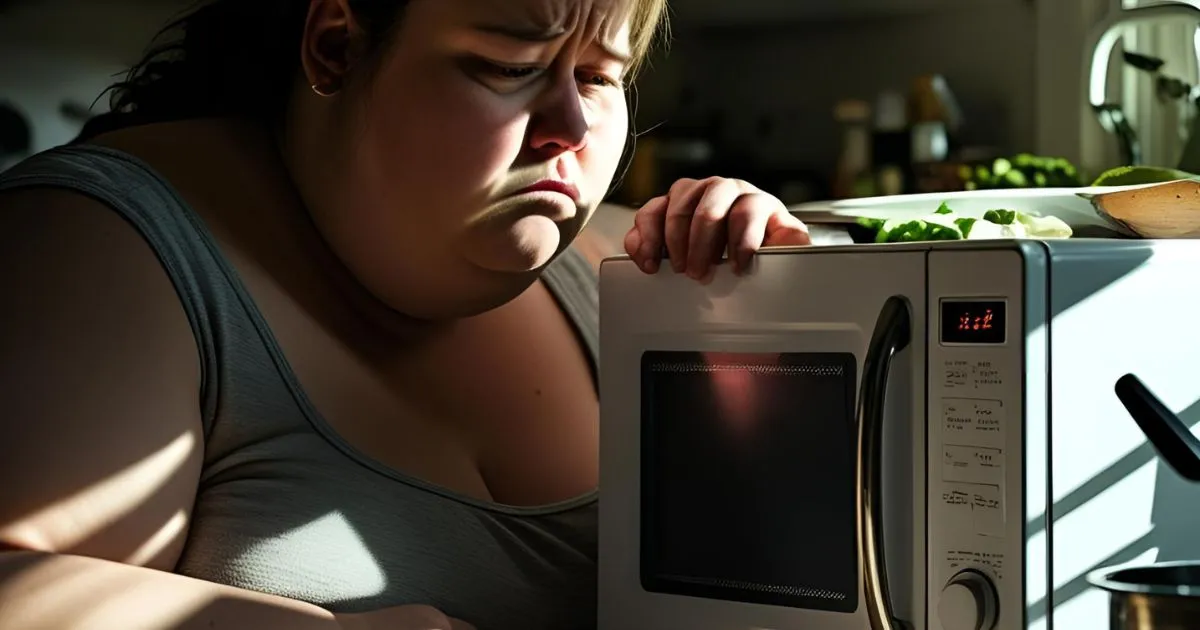The convenience of microwave ovens is undeniable, but concerns about their impact on food and health persist. Some claim that microwaving food may contribute to cancer and other illnesses by altering nutrients, creating harmful compounds, or leaching chemicals from containers. Notably, Dr. Linus Pauling, a two-time Nobel Prize winner, suggested that microwaving converts L-type amino acids in proteins into unnatural D-type amino acids, which are metabolically unusable and may promote harmful reactive oxygen species (ROS), potentially leading to cellular damage and chronic diseases. Below, we explore the evidence surrounding these claims, drawing on insights from experts and studies, while offering practical alternatives for safer cooking.
Potential Health Risks of Microwaved Food
Nutrient Degradation
All cooking methods reduce nutrient content to some extent, but microwaving’s rapid, uneven heating may exacerbate losses in certain cases. A 2009 study in the Journal of Agricultural and Food Chemistry found that microwaving beef, pork, and milk caused a 30-40% loss of vitamin B-12, converting it to an inactive form. Similarly, a Pediatrics study showed that microwaving breast milk for just 30 seconds destroyed its lysozyme and antibodies, critical for infant immunity. However, a 2023 study noted that microwaving vegetables like broccoli can retain more glucosinolates (cancer-fighting compounds) than boiling due to shorter cooking times and minimal water use. The impact varies by food type and cooking method, but nutrient loss is a concern with prolonged or high-power microwaving.
Below, I address your request for sources of vitamin B12 for vegans, examples of nutritional yeast as a source, its benefits, and sample vegan recipes that incorporate B12-rich ingredients while minimizing nutrient degradation (e.g., from microwaving, as discussed previously). I’ll also consider the context of vitamin B12 loss and dementia risk from our prior conversation.
Sources of Vitamin B12 for Vegans
Vitamin B12 is naturally found in animal products, making it challenging for vegans to obtain without supplementation or fortified foods. Below are reliable vegan sources:
Fortified Nutritional Yeast:
Description: A deactivated yeast (Saccharomyces cerevisiae) often fortified with B12, used as a cheesy, nutty flavoring in vegan dishes.
B12 Content: Varies by brand; e.g., Bragg Nutritional Yeast provides ~7.2 mcg per 2 tbsp (120% of the daily value, DV, of 2.4 mcg for adults).
Availability: Widely available in grocery stores or online.
Fortified Plant-Based Milks:
Examples: Soy, almond, or oat milk (e.g., Silk Soy Milk, ~1.2 mcg B12 per cup, 50% DV).
Note: Check labels, as not all brands are fortified.
Fortified Cereals:
Examples: Kellogg’s Corn Flakes or Cheerios (0.6–6 mcg per serving, depending on the brand).
Tip: Choose low-sugar options for better health.
B12 Supplements:
Forms: Cyanocobalamin or methylcobalamin (e.g., 500–1000 mcg daily or 2000 mcg weekly).
Benefit: Ensures consistent intake, especially for those with limited access to fortified foods.
Fortified Meat Substitutes:
Examples: Beyond Meat products or tempeh (some brands, ~0.5–2 mcg per serving).
Note: Not all vegan meats are fortified; check labels.
Other Fortified Products:
Vegan spreads (e.g., Marmite, ~0.5 mcg per tsp) or fortified juices.
Note on Natural Sources: Some plant foods like spirulina or seaweed (e.g., nori) contain B12 analogs, but these are largely inactive in humans and unreliable for meeting B12 needs (Nutrition Reviews, 2018).
Nutritional Yeast: B12 Content and Benefits
B12 Content:
Fortified nutritional yeast is a top vegan B12 source. For example:
Bob’s Red Mill Nutritional Yeast: ~4.8 mcg B12 per ¼ cup (200% DV).
Bragg Premium Nutritional Yeast: ~7.2 mcg per 2 tbsp.
Always confirm fortification on the label, as unfortified yeast contains no B12.
Benefits:
Prevents B12 Deficiency: Provides a bioavailable source to prevent anemia, neurological issues, and dementia risk (as discussed, low B12 is linked to cognitive decline via homocysteine elevation and brain atrophy; Journal of Alzheimer’s Disease, 2014).
Nutrient-Dense: Rich in protein (8g per 2 tbsp), fiber, and B vitamins (thiamin, riboflavin, B6), supporting energy metabolism.
Low-Calorie Flavor Enhancer: Adds savory, umami taste to vegan dishes without added sodium or fat.
Versatile: Easy to incorporate into meals (sprinkled on popcorn, mixed into sauces, or used in baking).
Gut Health: Contains beta-glucans, which may support gut microbiota (Journal of Functional Foods, 2020).
Drawbacks:
Overcooking (e.g., prolonged microwaving) may degrade B12, as seen in the 2009 Journal of Agricultural and Food Chemistry study (30-40% B12 loss in animal products). While less studied in nutritional yeast, minimal heating is advisable.
Some brands may cause digestive discomfort in sensitive individuals due to high fiber.
Sample Vegan Recipes to Maximize B12 Retention
These recipes use nutritional yeast and fortified plant-based milks, with cooking methods to minimize B12 degradation (e.g., avoiding prolonged microwaving, as it can destroy 30-40% of B12 per the 2009 study).
Creamy Vegan Nutritional Yeast Pasta (No-Bake Sauce):
Ingredients (Serves 2):
8 oz whole-grain pasta
¼ cup fortified nutritional yeast (e.g., Bragg, ~4.8 mcg B12)
½ cup fortified soy milk (~0.6 mcg B12)
2 tbsp olive oil
1 garlic clove, minced
1 tsp lemon juice
Salt, pepper, and fresh parsley to taste
Instructions:
Cook pasta in boiling water (8–10 min), drain, and set aside. Avoid microwaving to preserve nutrients.
In a bowl, whisk nutritional yeast, soy milk, olive oil, garlic, and lemon juice until smooth (no cooking to retain B12).
Toss sauce with warm pasta, season, and garnish with parsley.
B12 Content: ~5.4 mcg per serving (~225% DV).
Benefits: No-heat sauce preserves B12; whole-grain pasta adds fiber to support brain health.
Tip: Store leftovers refrigerated and reheat gently (low heat, not microwaved) to minimize B12 loss.
Nutritional Yeast Sprinkle for Breakfast Bowl:
Ingredients (Serves 1):
1 cup fortified oat milk (~1.2 mcg B12)
½ cup fortified cereal (e.g., Cheerios, ~1.5 mcg B12)
1 tbsp fortified nutritional yeast (~2.4 mcg B12)
½ cup fresh berries
1 tbsp chia seeds
Instructions:
Combine cereal, berries, and chia seeds in a bowl.
Pour fortified oat milk over the mixture.
Sprinkle nutritional yeast on top (no cooking to preserve B12).
B12 Content: ~5.1 mcg per serving (~212% DV).
Benefits: Raw preparation ensures maximum B12 retention; berries provide antioxidants for cognitive health.
Tip: Use fresh, not microwaved, ingredients to avoid nutrient degradation.
Vegan Cheesy Broccoli Soup (Low-Heat Cooking):
Ingredients (Serves 4):
2 cups broccoli florets
1 cup fortified almond milk (~1.2 mcg B12)
⅓ cup fortified nutritional yeast (~9.6 mcg B12)
1 potato, diced
1 onion, chopped
2 cups vegetable broth
1 tbsp olive oil
Salt and pepper to taste
Instructions:
Sauté onion in olive oil in a pot over medium heat (5 min).
Add potato and broth, simmer until soft (10 min).
Add broccoli, cook for 3–4 min (light steaming to retain glucosinolates, per the 2023 study).
Blend with almond milk and nutritional yeast until smooth. Avoid reheating in microwave; use low stovetop heat if needed.
B12 Content: ~2.7 mcg per serving (~112% DV).
Benefits: Low-heat cooking preserves B12 and broccoli’s cancer-fighting compounds; potatoes add potassium for brain function.
Tip: Serve immediately to avoid nutrient loss from reheating.
Cooking Tips to Preserve B12
Avoid Prolonged Microwaving: The 2009 study showed 30-40% B12 loss in microwaved foods. Use stovetop, steaming, or raw preparations for fortified foods.
Short Cooking Times: Steam or lightly cook vegetables (e.g., 3–4 min for broccoli) to retain nutrients.
Check Fortification: Ensure nutritional yeast and plant milks are B12-fortified (look for “cyanocobalamin” on labels).
Supplements as Backup: If cooking losses are a concern, a daily B12 supplement (500–1000 mcg) ensures adequate intake.
Dementia Risk Context
As discussed, B12 deficiency increases dementia risk by elevating homocysteine and causing neurological damage (Journal of Alzheimer’s Disease, 2014). For vegans, consistent B12 intake from fortified foods like nutritional yeast or supplements is critical to maintain cognitive health, especially in older adults. These recipes provide high B12 doses while minimizing degradation, supporting brain health and reducing deficiency-related risks.
Vegans can obtain B12 from fortified nutritional yeast, plant-based milks, cereals, and supplements. Nutritional yeast is a versatile, nutrient-dense option, delivering ~2.4–7.2 mcg B12 per serving and benefits like protein and gut health support. Recipes like no-bake pasta sauce, breakfast bowls, and low-heat broccoli soup maximize B12 retention by avoiding excessive heat (e.g., microwaving, which degrades 30-40% of B12). These strategies help prevent deficiency, reducing risks like dementia. If you need more recipes, specific brands, or deeper dementia-related insights, let me know!
I’m assuming you’re asking about the relationship between vitamin B12 loss (e.g., due to nutrient degradation from cooking methods like microwaving) and the potential development of dementia, building on the previous discussion. If you meant something else by “relashioj,” please clarify, and I’ll tailor the response. Below is an explanation of how vitamin B12 deficiency, including from nutrient degradation, may contribute to dementia risk.
Connection Between Vitamin B12 Loss and Dementia
Vitamin B12 is critical for brain health, supporting nerve function, myelin sheath maintenance, and homocysteine metabolism. Its loss—whether through dietary insufficiency, malabsorption, or degradation from cooking (e.g., 30-40% loss in microwaved beef, pork, or milk, as noted in the 2009 Journal of Agricultural and Food Chemistry study)—can increase the risk of dementia, particularly in vulnerable populations. Here’s how:
Neurological Damage:
B12 deficiency impairs myelin production, which insulates nerve fibers. This can lead to cognitive dysfunction, memory loss, and confusion—symptoms resembling dementia.
Prolonged deficiency may cause irreversible nerve damage, increasing the likelihood of cognitive decline.
Elevated Homocysteine Levels:
B12 is essential for converting homocysteine to methionine. Deficiency leads to elevated homocysteine, a known risk factor for vascular dementia and Alzheimer’s disease.
Studies (e.g., a 2002 New England Journal of Medicine study) show high homocysteine levels correlate with faster cognitive decline and increased dementia risk.
Brain Atrophy:
Chronic B12 deficiency is linked to brain atrophy, particularly in areas like the hippocampus, critical for memory. A 2008 Neurology study found low B12 levels associated with reduced brain volume and cognitive impairment in older adults.
Impact of Nutrient Degradation:
Microwaving’s degradation of B12 (as seen in the 2009 study) reduces dietary intake, especially for those relying on animal-based foods. For individuals with already marginal B12 levels (e.g., vegans, elderly, or those with absorption issues like pernicious anemia), this loss can accelerate deficiency, heightening dementia risk over time.
For example, microwaving breast milk (noted in the Pediatrics study for other nutrient losses) could reduce B12 availability for infants, potentially affecting early brain development, though long-term dementia links are less studied.
Evidence Linking B12 Deficiency to Dementia
Epidemiological Studies: A 2014 Journal of Alzheimer’s Disease meta-analysis found that low B12 levels were associated with a higher risk of Alzheimer’s disease and vascular dementia, with odds ratios suggesting a significant correlation.
Clinical Trials: A 2010 PLOS ONE study showed that B12 supplementation in deficient individuals improved cognitive function, though results were less clear in those without overt deficiency.
Mechanistic Insights: B12 deficiency disrupts methylation processes in the brain, impairing DNA repair and increasing oxidative stress, both implicated in dementia pathology.
Vulnerable Populations
Elderly: Aging reduces stomach acid and intrinsic factor production, impairing B12 absorption. Combined with dietary B12 loss from cooking, this heightens deficiency risk and, consequently, dementia risk.
Vegetarians/Vegans: With no animal-based B12 sources, reliance on fortified foods or supplements is critical. Nutrient degradation in fortified products (e.g., microwaved plant-based milk) could exacerbate risks.
Infants: While the Pediatrics study focused on immunity-related nutrients in microwaved breast milk, B12 loss could affect early neurodevelopment, potentially contributing to long-term cognitive vulnerabilities, though direct dementia links are speculative.
Mitigating the Risk
Minimize B12 Loss: Use shorter microwaving times, lower power settings, and minimal water to preserve B12 in foods like meat and dairy. Steaming or consuming some foods raw (e.g., fortified cereals) can help.
Supplementation: B12 supplements (e.g. , cyanocobalamin or methylcobalamin) or fortified foods can offset losses, especially for at-risk groups. Regular blood tests can monitor B12 levels.
Dietary Diversity: Include B12-rich foods (e.g., eggs, fish, or fortified products) less affected by cooking methods.
Monitor Cognitive Health: Regular screenings for cognitive decline in older adults can catch early signs, with B12 deficiency testing as part of the workup.
The loss of vitamin B12 due to nutrient degradation (e.g., 30-40% loss from microwaving) can contribute to deficiency, which is linked to an increased risk of dementia through mechanisms like neurological damage, elevated homocysteine, and brain atrophy. The elderly, vegetarians, and those with absorption issues are particularly at risk. While cooking-related B12 loss alone may not directly cause dementia, it exacerbates deficiency in susceptible individuals, potentially compounding cognitive decline over time. To reduce risk, minimize nutrient degradation, ensure adequate B12 intake, and consult healthcare providers for persistent cognitive concerns or deficiency symptoms. If you’d like me to explore specific studies or other factors (e.g., genetics, lifestyle), let me know!
Formation of Harmful Compounds
Microwaving starchy foods like potatoes at high temperatures can produce acrylamide, a neurotoxic and potentially carcinogenic compound. Professor Betty Schwartz from the Hebrew University of Jerusalem noted that acrylamide, formed when sugars and starches are heated, may cause DNA damage in animal studies, though human evidence remains limited. A 2020 review in PMC confirmed that acrylamide is a concern in microwaved and conventionally cooked foods, but strategies like soaking potatoes in water before microwaving can reduce its formation. Additionally, Dr. Pauling’s claim about D-type amino acids generating ROS suggests a pathway for oxidative stress, which could contribute to inflammation and diseases like cancer, though direct evidence linking this to microwaving is scarce.
Chemical Leaching from Plastics
A significant health concern arises from microwaving food in plastic containers. The American Academy of Pediatrics and Professor Rolf Halden from Arizona State University warn that plastics, even those labeled “microwave-safe,” can release microplastics, bisphenol A (BPA), and phthalates when heated. A 2023 Nature study found that microwaving plastics increases chemical leaching, potentially disrupting hormones and raising risks for cancer and other illnesses. These compounds are linked to endocrine disruption, fertility issues, and immune system effects. Using glass or ceramic containers eliminates this risk.
Controversial Claims and Limited Studies
Some sources, like a 1991 study by Dr. Hertel, suggest that microwaved food may cause blood changes linked to health deterioration, but this study was small (eight participants) and lacks replication. Posts on X have claimed that microwaving causes 60-90% nutrient loss or creates carcinogenic byproducts, often citing Soviet-era research or anecdotal concerns. However, these claims are not supported by robust scientific evidence and are considered inconclusive. The FDA, WHO, and American Cancer Society maintain that microwaves use non-ionizing radiation, which doesn’t alter DNA or cause cancer directly. A 1997 review by Peter Valberg found no causal link between microwave exposure and cancer, though long-term human studies are limited.
Counterarguments: Is Microwaving Safe?
The FDA, WHO, and Harvard Health assert that microwaves are safe when used correctly, emphasizing that non-ionizing radiation doesn’t cause cancer or make food radioactive. Microwaving can preserve nutrients better than boiling due to shorter cooking times, as noted in a 2021 Harvard Health article. For example, microwaving broccoli retains more vitamin C than prolonged cooking. Regulatory standards ensure minimal radiation leakage, and safety features like door interlocks reduce risks. However, these assurances assume proper use, undamaged appliances, and microwave-safe containers.
Practical Alternatives for Healthier Cooking
To minimize potential risks and prioritize body wellness, consider traditional cooking methods over microwaving:
- Stovetop or Oven Cooking: Reheating food in a pan or oven takes only slightly longer than microwaving (e.g., 5-10 minutes versus 2-3 minutes) and avoids uneven heating or chemical leaching. For example, sautéing vegetables on low heat preserves texture and nutrients.
- Defrosting Safely: Instead of microwave defrosting, which can degrade nutrients and create hot spots, transfer frozen food to the fridge 12-24 hours in advance. This slow thawing maintains food quality and safety.
- Steaming or Baking: These methods retain nutrients better than microwaving or boiling. Steaming vegetables preserves water-soluble vitamins like vitamin C, while baking avoids the high temperatures that form acrylamide in starchy foods.
- Use Glass or Ceramic: Always use microwave-safe glass or ceramic containers to avoid chemical leaching from plastics.
While mainstream authorities like the FDA and WHO deem microwaves safe, concerns about nutrient loss, acrylamide formation, ROS generation (as per Dr. Pauling), and chemical leaching from plastics suggest caution. The lack of long-term human studies leaves some questions unanswered, particularly regarding chronic exposure to microwaved food. To safeguard your health, prioritize traditional cooking methods like stovetop, oven, or steaming, which preserve nutrients and avoid potential toxins. For defrosting, plan ahead by using the fridge. By choosing these methods, you can enjoy nutrient-rich meals without the uncertainties tied to microwaving. For personalized advice, consult a nutritionist or trusted health resource.

Does Microwaved Food Contribute to Fat Gain?
There’s no direct evidence that microwaving food inherently causes fat gain. However, several indirect mechanisms related to nutrient alteration, chemical leaching, and dietary patterns could influence weight management:
- Nutrient Degradation and Dietary Impact
Microwaving can reduce certain nutrients, potentially affecting metabolism and appetite regulation. For example, a 2009 study in the Journal of Agricultural and Food Chemistry found that microwaving beef, pork, and milk caused a 30-40% loss of vitamin B-12, an essential nutrient for energy metabolism. Insufficient B-12 could lead to fatigue, potentially reducing physical activity and indirectly contributing to weight gain. Additionally, uneven heating in microwaves may degrade proteins (as noted by Dr. Pauling), potentially affecting satiety. Poor-quality proteins might not satisfy hunger as effectively, leading to overeating and increased calorie intake, which could contribute to fat gain over time. However, no studies directly link microwaved food to obesity. - Chemical Leaching from Plastics
Microwaving food in plastic containers, even those labeled “microwave-safe,” can release hormone-disrupting chemicals like bisphenol A (BPA) and phthalates, as confirmed by a 2023 Nature study. These compounds are linked to endocrine disruption, which may interfere with metabolism and fat storage. For instance, a 2018 Environmental Health Perspectives study suggested that BPA exposure could alter insulin sensitivity and promote fat accumulation in animal models. While human evidence is less conclusive, frequent consumption of food microwaved in plastic could theoretically contribute to metabolic changes that favor fat gain. Using glass or ceramic containers eliminates this risk. - Acrylamide Formation and Inflammation
Microwaving starchy foods like potatoes at high temperatures can produce acrylamide, a potential carcinogen, as noted by Professor Betty Schwartz from the Hebrew University of Jerusalem. Acrylamide and ROS (linked to D-type amino acid formation, per Dr. Pauling) may cause inflammation, which is associated with obesity. A 2020 Nature Reviews Endocrinology review linked chronic inflammation to insulin resistance, a condition that can promote fat storage. While acrylamide’s role in weight gain is not fully established, reducing its formation by avoiding high-power microwaving of starchy foods is a prudent step.
Convenience Foods and Caloric Intake
Microwaves are often used to prepare processed, calorie-dense convenience foods (e.g., frozen pizzas, microwave dinners), which are high in refined carbs, sugars, and unhealthy fats. A 2019 American Journal of Clinical Nutrition study found that diets high in ultra-processed foods are linked to increased calorie consumption and weight gain. While this isn’t exclusive to microwaving, the appliance’s association with quick, low-nutrient meals may indirectly contribute to fat gain. Choosing whole, fresh foods cooked traditionally can help manage calorie intake.
Cancer and Other Illnesses: Revisiting the Risks
Beyond fat gain, concerns about cancer and other illnesses persist:
- Cancer Risk: The FDA, WHO, and American Cancer Society state that microwaves use non-ionizing radiation, which doesn’t damage DNA or cause cancer. However, acrylamide in microwaved starchy foods is a potential carcinogen in animal studies, though human evidence is limited. Dr. Pauling’s claim about ROS from altered proteins suggests a pathway for cellular damage, but direct links to cancer are unproven. A 1997 review by Peter Valberg found no causal link between microwave use and cancer, though long-term studies are scarce.
- Other Illnesses: ROS and inflammation from microwaved food could contribute to chronic conditions like heart disease or diabetes, as oxidative stress is a known risk factor (Antioxidants & Redox Signaling, 2021). Chemical leaching from plastics may also disrupt immune and hormonal systems, per the American Academy of Pediatrics. A 1991 study by Dr. Hertel claimed blood changes from microwaved food, but its small sample size (eight participants) and lack of replication limit its credibility.

Healthier Cooking Alternatives
To minimize potential risks and support overall health, consider traditional cooking methods over microwaving:
- Stovetop or Oven Cooking: Reheating in a pan or oven takes slightly longer (5-10 minutes vs. 2-3 minutes in a microwave) but preserves nutrient quality and avoids chemical leaching. For example, gently sautéing vegetables retains vitamins and flavor.
- Defrosting Safely: Instead of microwave defrosting, which can degrade nutrients and create uneven textures, place frozen food in the fridge 12-24 hours in advance. This method maintains food integrity and safety.
- Steaming or Baking: These methods preserve water-soluble nutrients like vitamin C better than microwaving or boiling. Steaming vegetables or baking proteins avoids acrylamide formation in starchy foods.
- Use Glass or Ceramic: Always use microwave-safe glass or ceramic containers to prevent chemical leaching from plastics.
Focus on Whole Foods: Avoid reliance on processed microwave meals, which are often high in calories and low in nutrients. Opt for fresh, minimally processed ingredients cooked traditionally to support weight management and health.
While there’s no direct evidence that microwaved food causes fat gain, its potential to degrade nutrients, produce acrylamide, and leach chemicals from plastics could indirectly influence metabolism, inflammation, and weight. Concerns about cancer and other illnesses stem from acrylamide, ROS (as per Dr. Pauling), and endocrine disruptors, but mainstream authorities like the FDA and WHO consider microwaves safe when used correctly. The lack of long-term human studies leaves some uncertainty, particularly regarding chronic exposure. To prioritize wellness and minimize risks, use traditional cooking methods like stovetop, oven, or steaming, and plan ahead for defrosting in the fridge. These practices preserve nutrients, reduce harmful compounds, and support a balanced diet less likely to contribute to fat gain or illness. Consult a nutritionist or trusted health resource for personalized guidance.
Why We Don’t Use Microwaves at Harmony Hill Health Retreat
In a fast-paced world that prioritizes convenience, the microwave oven has become a go-to for meal prep. But here at Harmony Hill Health Retreat, we believe your body deserves more than speed—it deserves nourishment. That’s why we do not use microwaves in our kitchen. Every meal served is thoughtfully prepared using traditional cooking methods that protect nutrients and support your body’s natural healing.
As one of the most holistic wellness retreats Australia offers, we go beyond surface-level relaxation. Our wellness philosophy is rooted in mindful, organic living—from the peaceful surroundings to the food you eat.
Our retreat kitchen uses only traditional, gentle cooking techniques that preserve the full nutritional value of your meals. Every dish supports your body’s detox and healing process—naturally.
All programs include daily healthy meals prepared without microwaves, organic skin treatments, and one-on-one wellness support. Learn more about what we offer at Harmony Hill Health Retreat.
A Book That Mirrors Our Mission
Are you ready to free your mind from fear and awaken your natural power?
Your Organic Superpower is not just a book—it’s a transformational journey.
This powerful guide helps you:
- Rewire limiting beliefs
- Heal past programming
- Build a fearless, successful mindset
- Tap into your organic ability to thrive
It’s the perfect companion to your retreat or wellness lifestyle. Whether you’re relaxing in our mindfulness retreat or continuing your personal growth at home, this book supports you in stepping fully into your true potential.
At the health retreat, every choice we make—from how we cook your meals to the energy we cultivate—is designed to elevate your well-being. Say no to shortcuts. Say yes to organic living, deep healing, and a lifestyle that honors your highest self.





